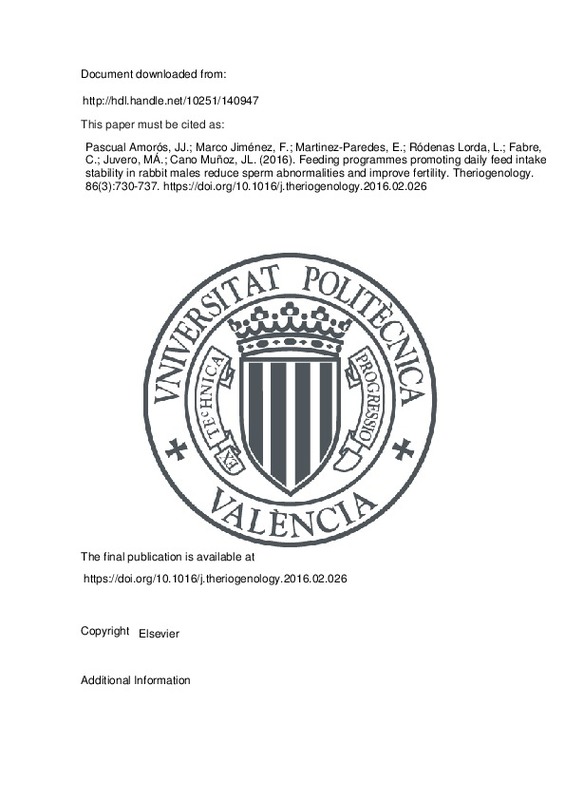JavaScript is disabled for your browser. Some features of this site may not work without it.
Buscar en RiuNet
Listar
Mi cuenta
Estadísticas
Ayuda RiuNet
Admin. UPV
Feeding programmes promoting daily feed intake stability in rabbit males reduce sperm abnormalities and improve fertility
Mostrar el registro sencillo del ítem
Ficheros en el ítem
| dc.contributor.author | Pascual Amorós, Juan José
|
es_ES |
| dc.contributor.author | Marco Jiménez, Francisco
|
es_ES |
| dc.contributor.author | Martinez-Paredes, Eugenio
|
es_ES |
| dc.contributor.author | RÓDENAS LORDA, LUIS
|
es_ES |
| dc.contributor.author | Fabre, Cristina
|
es_ES |
| dc.contributor.author | Juvero, Miguel Ángel
|
es_ES |
| dc.contributor.author | CANO MUÑOZ, JOSE LUIS
|
es_ES |
| dc.date.accessioned | 2020-04-17T12:51:18Z | |
| dc.date.available | 2020-04-17T12:51:18Z | |
| dc.date.issued | 2016 | es_ES |
| dc.identifier.issn | 0093-691X | es_ES |
| dc.identifier.uri | http://hdl.handle.net/10251/140947 | |
| dc.description.abstract | [EN] Feeding programs promoting daily feed intake (DFI) stability in rabbit males could be useful to ensure successful coverage of their nutritional requirements and for continued production of quality semen. To evaluate two feeding systems designed to reduce DFI variability, 115 rabbit males at age 1.2 years were randomly assigned to three different treatments for 294 days: CS, animals fed ad libitum with a control diet (127-g starch and 281-g total soluble fiber [hemicellulose + soluble fiber] kg(-1) dry matter); SF, males fed ad libitum with diet enriched in soluble fiber (86-g starch and 330-g total soluble fiber kg(-1) dry matter); and R, animals fed with CS diet but daily restricted to maintenance requirements. Feed intake, body weight, body condition, and variability of DFI were controlled every 42 days, and individual semen volume and sperm motility, concentration, acrosome status, and abnormalities every 15 days. In six commercial farms, the number of females inseminated, pregnant and kindling, as well as the number of kits born alive, was registered for 15,893 inseminations with pooled semen from each treatment. DFI was significantly lower for R males than for the other treatments (on average, -12 +/- 4 g/day; P < 0.001). Daily weight gain of R males was close to zero and significantly lower than in the other groups (-1.42 g/day; P < 0.001). Variability of DFI was significantly (P < 0.01) lower for R males (7%) than for males of dietary treatments CS (13%), with SF males showing intermediate values (11%). Semen from R males presented lower sperm abnormalities (-5.9%; P < 0.05) and higher percentages of normal and motile spermatozoa (-3.4% than SF males; P < 0.05). Dietary treatments formulated to reduce DFI variability (SF and R) led to an improvement of kindling to pregnant and kindling to insemination ratio (+0.039 and + 0.060 +/- 0.015, respectively; P < 0.05) compared with CS treatment. In conclusion, a moderate restriction of rabbit males may be useful to fit their needs and provide a constant daily supply of nutrients, with some sperm morphologic characteristics being improved, as well as the fertility of their pooled semen. | es_ES |
| dc.description.sponsorship | The authors thank the Spanish Ministry of Agriculture, Food and the Environment (Project PRE/917/2013) for the economic support to conduct this study. | es_ES |
| dc.language | Inglés | es_ES |
| dc.publisher | Elsevier | es_ES |
| dc.relation.ispartof | Theriogenology | es_ES |
| dc.rights | Reserva de todos los derechos | es_ES |
| dc.subject | Rabbit males | es_ES |
| dc.subject | Feed intake | es_ES |
| dc.subject | Restriction | es_ES |
| dc.subject | Soluble fiber | es_ES |
| dc.subject | Semen | es_ES |
| dc.subject | Fertility | es_ES |
| dc.subject.classification | NUTRICION Y BROMATOLOGIA | es_ES |
| dc.subject.classification | PRODUCCION ANIMAL | es_ES |
| dc.title | Feeding programmes promoting daily feed intake stability in rabbit males reduce sperm abnormalities and improve fertility | es_ES |
| dc.type | Artículo | es_ES |
| dc.identifier.doi | 10.1016/j.theriogenology.2016.02.026 | es_ES |
| dc.relation.projectID | info:eu-repo/grantAgreement/MAAMA//PRE%2F917%2F2013 | |
| dc.rights.accessRights | Abierto | es_ES |
| dc.contributor.affiliation | Universitat Politècnica de València. Departamento de Ciencia Animal - Departament de Ciència Animal | es_ES |
| dc.description.bibliographicCitation | Pascual Amorós, JJ.; Marco Jiménez, F.; Martinez-Paredes, E.; Ródenas Lorda, L.; Fabre, C.; Juvero, MÁ.; Cano Muñoz, JL. (2016). Feeding programmes promoting daily feed intake stability in rabbit males reduce sperm abnormalities and improve fertility. Theriogenology. 86(3):730-737. https://doi.org/10.1016/j.theriogenology.2016.02.026 | es_ES |
| dc.description.accrualMethod | S | es_ES |
| dc.relation.publisherversion | https://doi.org/10.1016/j.theriogenology.2016.02.026 | es_ES |
| dc.description.upvformatpinicio | 730 | es_ES |
| dc.description.upvformatpfin | 737 | es_ES |
| dc.type.version | info:eu-repo/semantics/publishedVersion | es_ES |
| dc.description.volume | 86 | es_ES |
| dc.description.issue | 3 | es_ES |
| dc.relation.pasarela | S\322862 | es_ES |
| dc.contributor.funder | Ministerio de Agricultura, Alimentación y Medio Ambiente | es_ES |







![[Cerrado]](/themes/UPV/images/candado.png)

